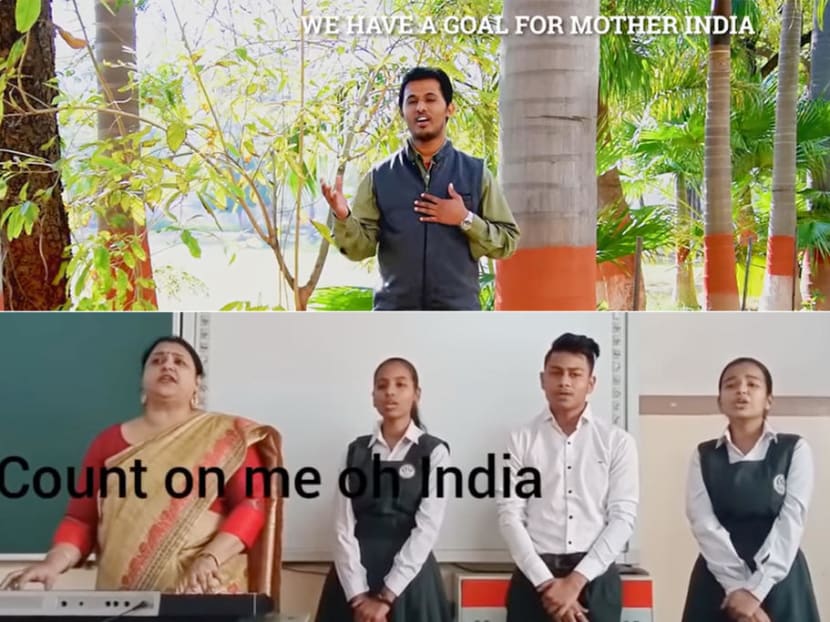Government was ready to take legal action over Count on Me copyright claims: Edwin Tong
SINGAPORE — The Government was prepared to initiate legal proceedings over ownership claims of national song Count on Me, Singapore, said Culture, Community and Youth Minister Edwin Tong on Monday (April 5).

A screenshot of a video showing people in India singing a song that sounds close to Count on Me, Singapore.
SINGAPORE — The Government was prepared to initiate legal proceedings over ownership claims of national song Count on Me, Singapore, said Culture, Community and Youth Minister Edwin Tong on Monday (April 5).
He was responding in Parliament to a question by Non-Constituency MP Leong Mun Wai (PSP) on the actions the Government has taken to protect Singapore’s copyright on the song. Indian composer Joey Mendoza had claimed he wrote the nearly identical We Can Achieve three years before Count on Me, Singapore.
Mr Tong said the Ministry of Culture, Community and Youth (MCCY) first received feedback that We Can Achieve had been featured in several videos, with some apparently of Indian schoolchildren.
The song was noted to be “almost identical” to Count on Me, Singapore, with some minor differences. The students appeared to be expressing love for their country and the song was not “disrespectfully treated”, he said.
Subsequently, the publisher of We Can Achieve acknowledged that the song appeared to have been "substantially copied", apologised and removed the videos from their platforms.
“We did not believe that there was any ill will or malice intended, and hence accepted their apology,” said Mr Tong.
Later, Mr Mendoza claimed that he had written We Can Achieve in 1983, which the ministry found to be an “untenable assertion”, given its similarity to Count on Me Singapore.
“If his claim was right, it would be a direct affront to our own ownership and interest in the national song Count on Me, Singapore,” said the minister.
“We thus pressed Mr Mendoza to substantiate his claims. If he could not, then he should withdraw them. We were prepared to initiate legal proceedings, if necessary, to protect our position.”
In addition, the ministry undertook “extensive fact-checking” to refute Mr Mendoza’s claims, said Mr Tong, and obtained evidence of Mr Hugh Harrison composing Count on Me, Singapore.
In response to MCCY’s request for proof, Mr Mendoza retracted his claims and informed his associates and their networks to remove the song.
“We have thus let the matter rest on this basis,” said the minister.
“MCCY takes any challenge to our proprietary rights and interests in our national songs and symbols very seriously and we will take the necessary steps to protect them,” said Mr Tong.
The Singapore Arms and Flag and National Anthem legislation, as well as the Copyright Act, protect these songs and symbols and prevent misuse that might “diminish or denigrate” their standing.
“At the same time, we should not take umbrage at every such use, and resort to legal remedies each time. A careful judgment is made in each case, as to whether and if so what, action is to be taken,” he said.
MONITORING USE OF NATIONAL SONGS AND SYMBOLS
In response to a question by MP Gerald Giam (WP-Aljunied) on how regularly the Government checks for infringement of Singapore’s symbols, Mr Tong said that the ministry monitors reports on the use of national songs and symbols by the media, public feedback and "online sensing".
“Our symbols have generally been treated with respect and dignity,” he said.
Although there have been rare cases of flag-burning, usually involving other forms of misconduct, these are often dealt with swiftly under the law, he said.
MCCY is also exploring whether there is a need to enhance intellectual property protection for Singapore’s symbols, he added.
“Honouring and respecting our symbols, however, is not something that is achieved only by legal regimes or protecting copyright. We must also cultivate and sustain the strong connections and respect that Singaporeans feel for the symbols and songs,” Mr Tong said.
This is why MCCY convened a citizens’ workgroup on the national symbols to solicit public views, he said.
In a follow-up question by Mr Giam on whether the Government holds the exclusive copyright to the music and lyrics of all national songs, Mr Tong said that the copyright for most songs written by third parties lies with the Government.
“There are some other arrangements where the copyright in the composer and lyricist might be different, but in all such situations, it’s either owned by the Government or managed by the Government,” he said.
As such, third parties wanting to perform the songs will have to seek permission from the Government.
"MORE EFFECTIVE" FOR MR MENDOZA TO WITHDRAW CLAIMS
In a supplementary question, Mr Leong asked why the Government did not “press the issue further” and make Mr Mendoza admit that he had plagiarised the song.
Mr Tong cautioned Mr Leong against conflating the Government’s assertion of rights with taking legal actions.
“They are not necessarily the same thing. And in this case, it was far more efficient, quicker and a lot more effective for Mr Mendoza to be persuaded that his own position was untenable, for his claims to be withdrawn by himself,” he said. CNA
For more stories like this, visit cna.asia.









